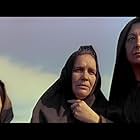I was not expecting much from this film, especially since I was only vaguely aware of its content: that said, I ended up being pleasantly surprised by the outcome – even if it did not prove that much of a spectacle (despite the period setting). In fact, the intense and rather downbeat narrative unfolds against a backdrop of class manipulation and ruthless banditry in 19th century Sicily: the young sister of protagonist Fernando Lamas rejects the advances of a middle-aged baron (who boasts of having had every girl in the village!) and leaves her home on a stagecoach, which is then waylaid by outlaws – the passengers are all killed but not before she has been gang-raped!
Lamas, knowing the reason why she had tried to start a new life elsewhere, sets out on his revenge by first eliminating the lecherous nobleman (after literally playing a game of hide and seek with him during a religious procession!). His plan to get even with the desperadoes, however, is more elaborate – as he determines to infiltrate the outfit and learn the names of every man responsible for his sister's violent death; to this end, he finds an unexpected ally in British lady journalist Lisa Gastoni (less showy than either of the other roles for Lenzi that I have just watched her in, namely QUEEN OF THE SEAS {1961} and MESSALINA VS. THE SON OF HERCULES {1964}) intent on interviewing – and, by extension, bestowing celebrity upon – the group. Anyway, the hero's baptism of fire sees him single-handedly liberate one of their number from the gallows; besides, he falls for the redheaded sister (played by Liana Orfei) of another member.
Before long, the true nature of both Lamas and Gastoni are discovered: the latter is shot dead in cold blood, but he is hounded all over the plains by his would-be cohorts (the title presumably refers to his showdown with the mob leader) and, unsurprisingly, the girl sides with her lover in the matter (even if he is forced to kill her own sibling). The last act, then, acquires Shakespearean overtones (specifically "Hamlet") – as the dusty ground becomes riddled with corpses, including the romantic couple expiring in each others' arms. This particular fate of the protagonists, the film's very title and the presence of bandits in the narrative also points towards the shadow of David O. Selznick's super-production DUEL IN THE SUN (1946) looming large over it. With this in mind, the film has a modest tragic power to it that, effectively complemented throughout by agreeable visuals, makes for an undeniably interesting (if minor) outing in the "Euro-Cult" stakes.









